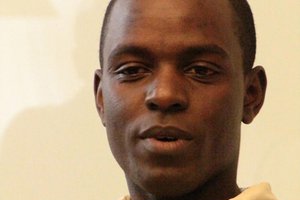One of Uganda’s leading LGBT activists will be in town next week to share his experiences living amid the country’s rabid homophobia, and to enlist the help of the local LGBT community to alleviate some of the dangers faced by LGBTs in the east African country.
Frank Mugisha will take part in community discussions Jan. 20 from 5-7 p.m. at the William Way LGBT Community Center, 1315 Spruce St., and 7-9 p.m. at the University of Pennsylvania’s LGBT Center, 3907 Spruce St.
Mugisha is the executive director of Sexual Minorities of Uganda, the country’s primary agency that serves to provide support and resources to LGBT citizens and works to stem the tide of homophobic violence in the nation.
The oppressive environment faced by LGBTs in Uganda gained international attention in 2009 when lawmaker David Bahati introduced his Anti-Homosexuality Bill, seeking to expand the punishments for homosexual activity already prohibited by law. Bahati’s measure would introduce the death penalty for repeat offenders, those who are HIV-positive or those who have sexual relations with people under age 18, among other stipulations.
The bill caused an international outcry, but Bahati has not withdrawn the measure.
Mugisha said that, since the introduction of the bill, tensions have escalated.
“There’s been a lot of homophobia, a lot of harassment toward the LGBT community. There’s been harassment from law enforcement and also other people in the community, and it’s caused a lot of fear within the LGBT community.”
Mugisha said that, even if the measure doesn’t pass, the bill has led to an unwelcome focus on the LGBT community.
“People are scared to be arrested, scared what will happen if the law passes. I’ve seen a lot of people who were out go back into the closet because they’re so afraid.”
For a population that is largely underground, Mugisha is regarded as the public face of the LGBT community in Uganda.
As such, he has become accustomed to public ridicule and threats.
He said the publicity he’s received through his involvement with SMUG has served as a double-edged sword, as it has helped protect him somewhat from danger, but still continues to cripple his daily life.
“My being public is kind of my security, since there’s no security for us in Uganda. But people know me, so being public and outspoken is my security,” he said. “But I have to watch my back all the time. When I’m walking on the streets, I have to be careful, I have to know who’s following me. I have to know where to go. And I can’t go to public places or hang out with friends in bars. I can’t be free like anyone else.”
Mugisha’s notoriety skyrocketed last fall when Ugandan tabloid Rolling Stone (no association to the U.S. magazine) featured his name and photo on a list of LGBTs the publication suggested should be executed.
A Ugandan court earlier this month ruled that the magazine must stop outing gays, but the publication is appealing the decision.
While the environment faced by LGBTs in Uganda may seem a world away for Philadelphians, Mugisha said the American LGBT and ally communities can make a difference by focusing on awareness.
“People need to talk about the issues, tell everyone what’s going on. Knowing about it and being aware on an international level can mean that the government here can be pushed to stop discriminating against LGBT people,” he said. “And people in the United States need to ask their progressive movements here to try and highlight the issue, to learn about it, talk about it.”
Mugisha noted that Americans can also support the movement by donating to civil-rights agencies dedicating time to the cause.
Jen Colletta can be reached at [email protected].
